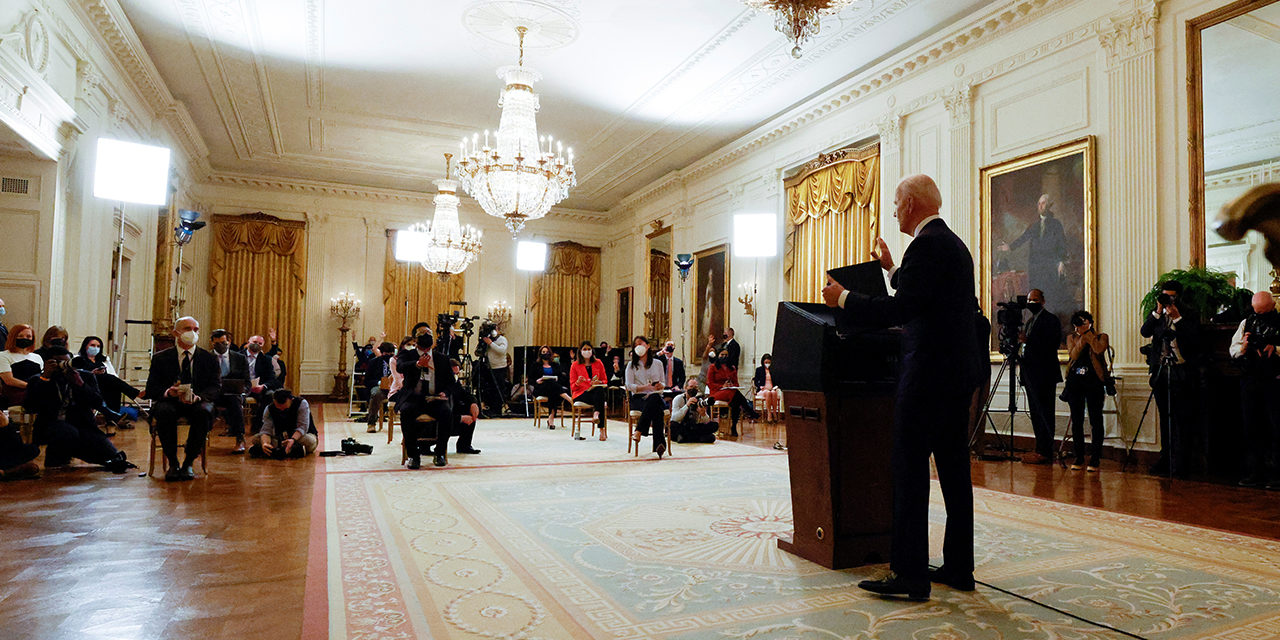President Joe Biden faced reporters Thursday for the first press conference of his tenure as the nation’s chief executive.
Presidential press conferences have become expected, predictable, and even routine in recent history, but that hasn’t always been the case. Much has been made about Mr. Biden breaking a 100-year record by taking 64 days to hold his first presser – but it took 124 years for the first formal media gaggle to take place at all.
Woodrow Wilson is credited with holding the first presidential press conference in 1913. But it’s not that his predecessors didn’t speak with journalists. Instead, they tended to speak with reporters more informally or one-on-one.
For example, Teddy Roosevelt was known to host scribes while having a shave in the White House barber shop. He was said to relish those sparring sessions. Franklin Roosevelt, crippled with polio, would regularly welcome reporters into the Oval Office where they would encircle the seated president. Some of his comments were on the record – and many were off.
My earliest memories of politics revolve around watching President Ronald Reagan’s prime time press conferences with journalists. I remember him regularly jousting with ABC’s Sam Donaldson and intrepid White House correspondent Helen Thomas.
Good press conferences are marked and measured not just by the answers given but the questions asked. Thursday’s session dealt with a wide range of issues, from the immigration crisis at the border, debate over the filibuster, and relations with China and Afghanistan, to name just a few of the subjects raised in the East Room.
All of these are trending issues, but it’s always disappointing when other morally pressing matters go unaddressed.
Silence, as is said, speaks its own language.
There were no questions about the expansion of abortion in the Equality Act or the bill’s call to redefine churches as “public accommodations.”
There were no questions about the federal authorization of taxpayer funds for the taking of innocent life in the recent COVID-19 stimulus bill.
Sharp, curious and informed questions can teach as much as they just tell.
Biblical scholars have calculated that Jesus asked over 300 questions in the New Testament. Of course, it’s likely He asked far more than that, but those are the ones recorded in the Gospels.
Jesus asked pressing, introspective questions such as:
- “Can any of you by worrying add a single moment to your lifespan?” (Matthew 6:27)
- “Why do you notice the splinter in your brother’s eye yet fail to perceive the wooden beam in your own eye?” (Matthew 7:2)
- “What do you want me to do for you?” (Matthew 20:32)
- “Have I been with you for so long and still you do not know me?” (John 14:9)
As it turns out, it’s been observed that in the Gospels, Jesus asked far more questions than He answered. It’s likely this was for a number of reasons, but especially one – He knew that one of the best ways to forge a relationship with someone is to have a thoughtful and sincere conversation with them. Monologues are boorish and often ineffective. On the other hand, get someone to critically think about an issue and you can go deep and perhaps even persuade them to your perspective.
As believers, we regularly engage with friends and family who may see the world from a very different point of view. Asking them why they believe what they do instead of telling them why what they believe is wrong is a good starting point for healthy, productive conversations.
Few people will ever have the opportunity to ask the president of the United States a question, but all of us have the chance to engage with people within our own circles of influence.
It’s unclear when the White House press corps will get another shot at asking President Biden more questions – but when they do, I hope they will press in on some of the critical subjects that went unasked and unanswered today.
Photo from LEAH MILLIS/REUTERS






